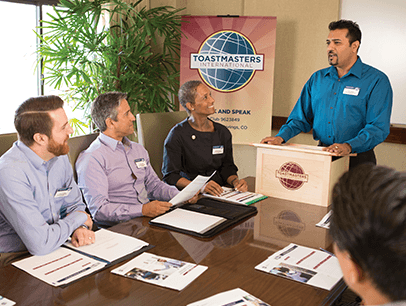
Evaluations—the practice of giving supportive, constructive feedback—have always been at the core of Toastmasters’ philosophy of learning by doing, listening, and improving.
Feedback is so fundamental to the Toastmasters experience that evaluation forms have recently been created to give club officers and District leaders the opportunity to have the same type of helpful feedback that is so essential in club meetings. Until now, there hasn’t been a consistent process to provide performance feedback to leaders at the club and District levels.
Forms for self-evaluation and group feedback are available to club officers. District leaders can also access self-evaluation and group forms for feedback on their specific responsibilities.
The new leader evaluation process is intended to benefit not only those currently in leadership positions, but all Toastmasters. Clubs and Districts can only be strengthened by involving leadership levels in productive conversations about leadership qualities, setting priorities, role responsibilities, mentoring new leaders, and more.
Overall, the self-evaluations and the group sessions will give leaders at both levels a mix of feedback—some possibly surprising, some possibly not—for guidance in accelerating their communication and leadership skills.
A Sense of Self
Self-assessments allow club officers and District leaders to take a personal, candid look at their successes and challenges. Ideally, leaders will complete self-assessments at the beginning and at the end of their terms. This creates a performance baseline for self-review and a way to record progress throughout the year. Another benefit? A mid-year check on interactions with your club or District gives you time to make changes if needed. The self-evaluations are primarily for each leader’s personal use throughout the year.
Feedback From Multiple Sources
In contrast, group feedback is set up for a 360-degree style approach for club and District leaders. This means that feedback forms are distributed to fellow Toastmasters, various leaders, club members and others, to collect full-circle feedback from a variety of viewpoints. Are leaders at both levels acting in accordance with the Toastmasters core values of integrity, respect, service, and excellence? Are they able to build and collaborate with teams, solve problems, and work well with fellow officers? Are leaders burnishing their abilities to manage change, set priorities, and motivate their colleagues? Are they setting strong examples for others to follow in their leadership footsteps?
Toastmasters who have used the 360-degree review have noted its value. Nikki Quinn, DTM, is a member of several clubs, including Sell the Sizzle, where she is Club President, and Carpe Diem Breakfast Toastmasters, where she is Vice President Public Relations. Both clubs are in Johannesburg, South Africa. Because she is active in several roles, Quinn has found group feedback most helpful. It’s important that a number of evaluators join the group feedback activity, so the person being evaluated gains a solid set of ideas and suggestions to consider. As always, constructive feedback on improvement is essential, Quinn says.
“Unless the person seeking evaluation encourages their peers to complete the forms, there isn’t enough of a cross section to make the feedback worthwhile,” Quinn notes. “And sometimes, reviewers forget the principles of feedback. They don’t give the recipient suggestions on how they can improve.”
Alison Nissen, DTM, Vice President Public Relations for Speak Up Houston Toastmasters, and a member of Talking Bull Club, both in Houston, Texas, agrees that evaluations are at the heart of the Toastmasters experience. Extending this time-honored practice to club and District leaders will enrich Toastmasters’ viability at every level.
“When someone goes above and beyond to offer feedback, it reminds us why we joined Toastmasters in the first place—to grow our speaking and leadership talents,” Nissen says. “Taking the time to reflect and offer positive, constructive feedback helps all of us become better Toastmasters, employees, and community leaders.”
Peggy Beach, DTM is a freelance writer and communications instructor in Raleigh, North Carolina. She is a Past District 37 Governor. A member of the Hi Rise Toastmasters in Raleigh and the Top Triangle Toastmasters in Morrisville, she is available at writereditorpeggybeach@gmail.com.
Related Articles

Evaluation
Making the Most of Evaluations

Evaluation
Learning to Evaluate Everybody

Evaluation



 Previous
Previous

 Previous Article
Previous Article